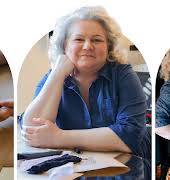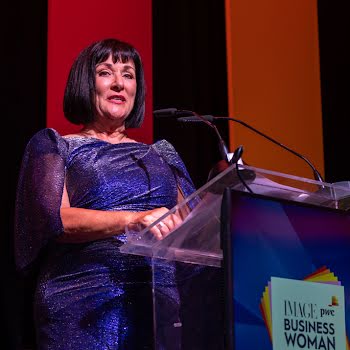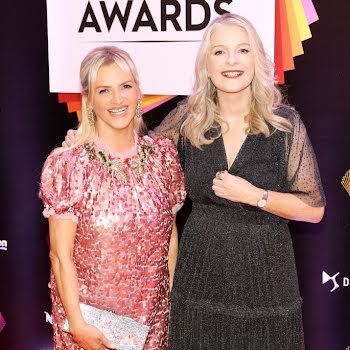Planning a career change in 2025? Nine career coaches share their best advice


For many people, the arrival of a new year is often a catalyst for a career change.
Whether you’re unhappy in your current job, or just feel like you need a fresh challenge to motivate you, switching lanes and making a career change requires bravery, self-assurance and a clear vision of what you want to achieve in your next step. Learning how to navigate an unfamiliar professional landscape can be a daunting task… so, where should you start?
To guide you, we spoke with some of the IMAGE Business Club coaches for their expert advice.
Niamh Ennis, change and transformation coach
When navigating career change…
- Get really clear on your vision. Define just what it is that you want from your career. Consider what excites you, your values, passions, and long-term goals to ensure the change feels right for you.
- Do your research. Explore industries, roles, and opportunities that really light you up. Speak to people in those fields who are already doing what you think you’d love to do, in order to gain insight and identify obstacles that you might not have thought of!
- Set a realistic timeline with actionable steps for your transition. Please don’t do anything rash like walk out on a job. If you do, then the decisions for your next steps will come from a place of fear.
- Talk it through: find a trusted mentor who can support you– someone who’ll work with you to give you the confidence and courage it will require to believe that change is possible for you and help you identify exactly what needs to be done to get you there.
- Always trust your intuition. Career changes often come with deep uncertainty so if something feels right, don’t ignore it.
Finally, please remember that it’s never too late to pursue a career that resonates with who you are and based on what success looks like for you now. The key is to take the leap with real clarity, utter purpose and a detailed plan.
Leonie Corcoran, executive and story coach
I still remember the quizzical looks and downright intrusive opinions shared with me when I told people I was leaving my permanent role as health and family editor with The Irish Times. Leaving a full-time, pensionable job with a reputable company? What WAS I thinking?
At the time, I did not have a concise narrative that I could share with others (which is something I highly recommend – and support clients with – because it is your story to own and humans will naturally create a narrative for you if you do not), but I knew I was seeking something more expansive; something that inspired me, something that supported others; something where I could enhance my knowledge and skills and ripple them outwards; and something that wasn’t based in a traditional office/newsroom set-up.
On reflection, knowing those things – the things I wanted – was a key starting point. When wearing my coaching hat, I support clients to feel into these areas regardless of what stage of career transition they are at, from initial thoughts right up to interviewing.
For some people, a guided visualisation of their future self can be enlightening, motivating them to move onto their next chapter armed with a vision of how they want to feel in their new role, how they want to be regarded and what they want to offer. They use this higher vision to put the actions in place (i.e, the actual search, networking, upskilling, CV-writing, etc.) to find the right match for them.
For others, visualisations are hard! If that’s you, start with the following question to claim your vision:
Imagine it is December 2026 and you are looking back at your work year with a grateful and satisfied feeling. What are you most proud of in that year? What energised you? What did you love working on? What type of people did you enjoy working with? Where are you? And what are you looking forward to in the year ahead? This can serve as a starting point to think about the big picture of your career options before you get into the logistics.
When you start to get into the detail, ask yourself the following five questions:
- What kind of work environment do you thrive in?
- What are your career non-negotiables, such as work-life balance or ethical considerations, and how can you prioritise them in your job search or career planning?
- How do you define success in your career, and what steps can you take to achieve it while maintaining your personal values and priorities?
- What are your biggest fears or obstacles when it comes to pursuing your career goals, and how can you overcome them?
- What is your ideal job or career path, and what steps do you need to take to get there?
Knowing what you do not want also yields a useful and powerful influence, but we know that moving “towards” something (i.e., the vision you want in your future) is more motivating than moving “away” from something (i.e., the things that annoy you in your current role). The latter can certainly inform some of your decisions but they will not support you in maintaining the energy needed for a significant career transition. For this, you need to tap into the vision. And what an exciting vision it can be!
Aisling Kennedy, self-belief coach
When you’re planning a career change, it’s natural to feel stuck or frustrated with your current role—it might even feel impossible to stay motivated. But focusing on all the ways your job isn’t right for you can quickly drain your energy and make the transition even harder. Instead, try shifting your perspective to the value you’re still creating right now. Whether it’s the skills you’re learning, the impact you’re having, or even small moments of connection. Finding purpose in your work now can help you maintain your energy and self-belief. This way, you’re stepping into your next career with clarity and confidence, rather than burnout.
Rowan Manahan, pitching and presentation coach
Like so many aspects of life, the job hunt is a pitching process. It can feel like you have little or no control over the process, but as you go through interviews, you quickly realise that a lot of the questions and concerns expressed by recruiters are very predictable.
Like any pitch, think in terms of timings. A few seconds and a handful of words for any ‘strapline’ length items. Some nice sharp 30-second summary material where you talk about a particular strength or a particular circumstance. And then the meatier items – typically 90-120 seconds each, in which you can spell out the situation, the process you applied, and the outcome – these are the classical competency or behavioural-based answers that comprise the bulk of any selection process.
In essence, your job is to research your audience, understand their needs and worries and more importantly, understand what constitutes a win for them in this hiring process – and start pitching yourself toward that. Do a wide trawl of everything you could talk about in an interview, hone down to the elements that they are going to be most interested in, build your narrative on those foundations and then rehearse the hell out of it so you are ready for anything when you’re in the interview room.
Emer Deane, leadership coach
Making a career change is exciting but can feel overwhelming, so break it down into achievable steps. Start with clarity. What’s inspiring this change? Whether it’s an old dream, the chance for a better quality of life, or a longing to do something more meaningful, get clear on your “why” and connect with the future you that’s already thriving in this new path. Next, get the facts. LinkedIn can be your best friend for some detective work—start by working backwards. Look at the profiles of people in the career you want. What qualifications and experience do they have? Identify people in this career and ask for their help by sharing their experience. My clients are often surprised by how willing people are to help when approached with genuine curiosity. Once you have the facts, start small—you don’t need a new degree to test the waters. Platforms like LinkedIn Learning, Coursera, and Udemy are great for exploring low-cost courses. Most universities offer short, online and affordable options to build your expertise. Government initiatives like Springboard+ offer free and heavily subsidised courses at cert, degree and master’s level. Volunteering is also a fantastic way to expand your network, gain valuable hands-on experience and it’s good for your health. Be your own greatest cheerleader, recognise the life experience, strengths and transferable skills you can bring to this new career. There will be twists and turns, but every challenge brings new learning. Celebrate the progress you’re making, no matter how small—it’s a sign of your courage and commitment to creating the life you truly want. Your future self is counting on you. I have seen people make stark career changes, from nursing to tech sales, sales to psychotherapy, accountancy to wellbeing entrepreneurship. If they can do it, so can you!
Sian Horn, female founder coach
We live in a world that emphasises career choice when, in reality, we should be embracing career flexibility. As someone who has always seized opportunities first and figured out the details later, I’ve never let a chance pass me by. Over the years, I’ve transitioned from one career to another—earning the nickname “the Madonna of business”—because when the joy fades, it’s time to move forward. Each role, whether that was teaching dance in my teens, pouring pints in my 20s, opening gyms in my 30s, qualifying as a Pilates instructor in my 40s, or training as a DJ in my 50s, has contributed to my growth. Variety isn’t just enriching, it’s essential for personal and professional evolution. It’s time we stop living to meet others’ expectations and start pursuing what truly brings us joy. Now is the moment to take that leap. Life is short, and no one will hand you the opportunity you’re waiting for; it’s up to you to grab it. We get one roll of the dice, so ask yourself: what’s really holding you back from change? Is it fear of failure, uncertainty, or judgment? Start small: write down your dreams, seek advice, take a course, or set one clear, achievable goal today. Action is the antidote to fear, and every small step builds momentum toward the life you truly want.
Michelle Ryan, human resources coach
Life is too short to be in a career that no longer serves us.
As we progress through life, finding a career that provides us with purpose and not just a paycheck becomes more important. Those common cliches such as; do a job you love and you will never have to work a day in your life – really resonate.
However, as we age, fear can set in and often women become more critical of themselves and don’t want to appear foolish or seek out what they believe is beyond them.
Demi Moore’s recent speech at the Golden Globes really rang true for me; “you can know the value of your worth if you just put down the measuring stick.”
I truly believe that in order to grow you must place yourself in situations that you may feel out of your depth. In 2023 I left a role in a great organisation to start my own small consultancy and although there have been days of worry, I am doing the work I want to do with the clients I want to work with and that alone is very rewarding.
Good luck to you all in 2025.
Jess Delaney-Ellwood, social media coach
I remember the first time I changed career/industry. To me, it was such an obvious thing to do, after a year in my job I realised my skills and desires in other industries and roles. I had my next role in mind and I was beyond excited to take a new direction. It was only as I started to discuss this with friends and family that I discovered the HUGE societal taboo around changing lanes. People told me, ‘You may never get another opportunity like this’, ‘How could you leave that company?!’, ‘You may not get the other job, it’s very ambitious’.
One month later I got the new job I wanted and it was brilliant! This learning experience came in handy years down the line when starting my own business and it continues to help me shut out any of the inevitable doubt.
NEVER forget these four tips:
- Go forward with confidence. Having a change in your career can introduce you to new skills and new perspectives.
- Prioritise happiness. It sounds cringy, but life is short and being happy should always be priority number one.
- Nothing is permanent. If you don’t like it, change back! Gone are the days that employers look down on short employment periods – now, cultural fit and experience come well above the old school ‘Gold Standard CV’.
- Changing is not quitting. Change is a source of renewal and progress… get excited!
I’ll leave you with one of my favourite quotes (apparently from Albert Einstein): ‘The definition of insanity is doing the same thing over and over again and expecting different results.’
Laura Nolan, growth strategy coach
This time two years ago, I took the plunge and made the brave/crazy decision to hand in my notice. I had spent the past year falling out of love with what I was doing and was left feeling a little lost and without purpose. I had always loved work and gotten so much self-actualisation from it so it was a scary time for me as I stepped back to take stock, get some perspective and figure out what I enjoyed and how to work my career around that. While I am still navigating my way through the process of crafting my “dream job”, I do feel like the past two years have taught me some valuable lessons.
- If you are starting to get a niggling feeling that you are done with your current role, address those feelings immediately before they become akin to an irreversible “ick”. Sometimes, it just means that you need to switch things up or address some frustrations with your manager/team and if you get that issue sorted you can regain the joy! If not, and it is definitely time to move on, then get the ball rolling ASAP before the negativity you have towards your role starts to impact your confidence. The optimum time to look for another job is when you feel like you are amazing and undervalued where you are and before you hate where you are so much that you make panicky decisions. Give yourself time to find the right next step!
- Create a list of the things you look for or are motivated by in a job/career. If you could only have three out of that list, what would they be? Then out of that list of three, whittle it down again to just one thing. It is important to know what you really want and what you actually need. We all assume it is money but, to revamp the words of the wise Spiderman, with great money, comes great responsibility and less work/life balance. What will make you happy and fulfilled? Let that be the basis of your new job search.
- Ask for advice. When you do decide what you want and have an idea of the type of role, industry or company that aligns with that, get out there and do some networking. Reach out to people working in those companies or in similar roles and ask if they would be open to a call or a quick coffee. The worst they could say is no but generally, you will find that people are pretty willing to help if they can. You could get some really valuable contacts and if nothing else, you might get some more insight into the career or role you are pursuing.
Photography by Helena Lopes via Pexels.




















